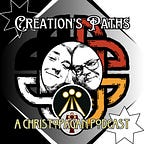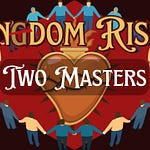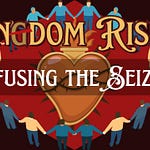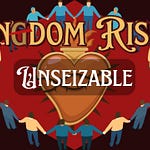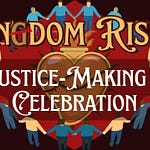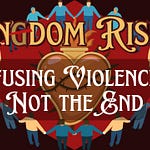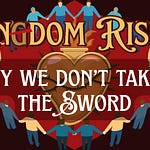Join us in this episode as Charlie, a non-binary sci-fi fantasy writer, and their husband Brian delve into the via Transformativa of the fourth path of creation spirituality. Explore the themes of change, transformation, and celebration during the full moon after Lúnasa. Learn about the importance of internal change, the influence of societal shifts, and the power of collective efforts in movements such as civil rights and climate activism. Discover how small victories and ongoing progress are essential in fostering lasting change. Don't miss out on this insightful discussion on recognizing and celebrating the harvest of change in our lives and society.
Transcript:
Charlie- New: [00:00:00] Hello and welcome to the full moon after Lúnasa. Today, as we do on the full moon, we're going to be talking about the via Transformativa of the fourth path creation spirituality. The path of change, transformation, and celebration. We're going to be talking about harvesting change.
Intro.
Hello everyone. My name is Charlie. I'm a non-binary scifi fantasy writer, and I am joined today by my husband, Brian. It's the day we're going to be. Celebrating commemorating. I don't even really know what the word is for the. The lunar things that we do. I haven't found a word that feels right for it. If anybody has a suggestion, please let me know because celebrating isn't really the right word, commemorating really isn't the right [00:01:00] word honoring. Isn't really the right word. Practicing. Isn't really the right word. I've been struggling with this for a couple of years now.
As we were here on the full moon after Lúnasa. We're going to talk about harvesting change. Because this is the first of the harvest festivals that we celebrated. And. Change really is something that you have to go out and get.
I feel like the most natural place to start with. This is. Change. Happens. Change is possible. People do change. People can change. You cannot change other people.
Brian - New: You can encourage others to change. that is still their choice.
Charlie- New: Change has to come from within. get really frustrated with this argument of people. Don't change people. Can't change. have changed a lot. I remember former me. In fact, I don't have to remember for me, I've been [00:02:00] podcasting since 2005. I can go back and listen to former me. And oh, I, I have changed a lot. In a lot of ways. Many of my opinions are not the same. Many of my attitudes have. Adjusted. My voice is completely different. Which is really funny because I had a friend. Go back into the archive and was like, oh, you don't even sound like the same person. Like, no, no. Even this podcast, which is not that old. The oldest episodes. My voice is very different. That is still old version of me. But it doesn't sound like me at all. Because I have changed. I have changed mentally, spiritually.
Again, a lot of my opinions have changed. I have grown. And I'm not saying this, like to pat myself on the back, but to say, I know that change is possible. And it gets really frustrating. When I see people. [00:03:00] Pretending that change cannot happen.
On the larger scale. I have watched this country. Devolve. Throughout my life time. In ways that. Honestly are shocking to me. In the coursing of the public discourse, the. things that are acceptable. The manners of speaking that are acceptable in public, discourse. I have watched it getting. Rougher and rougher and rougher and less. Attached to. Facts I don't think it was ever attached to logic. I think that's a sweet lie. We tell ourselves as we used to be logical back in the day and, uh, no. At least we agreed on basic facts. While that's not a good change, it is still changed. In other things I've seen a huge amount of change, I've watched homophobia get better. Like it's going away. In. Places. I never expected to see it going away.
We have to start. With this basic [00:04:00] anti cynicism move. Of accepting that change can and does happen. Because if we don't have that as a basic. Baseline understanding. Nothing else that we say matters.
Brian - New: If you're looking at a full field and you go, there's nothing out there to harvest. There's nothing to talk about at that point.
Charlie- New: Yeah, it gets strange to me that. We. Blind ourselves. I feel like this is like the recurring theme of the podcast of how we blind ourselves to. What's actually going on around us, but. We do very much blind ourselves to what's actively going on around us. Just going back. All that long ago. I was pleasantly surprised when Barack Obama won. The white house, because as a child, The idea. That anyone named Barack Obama and much less anybody who looked like him. Could win. a, major political, anything. Was hard to imagine. Now. In our current race. I'm not thinking that same way [00:05:00] about. Kamala Harris, right? That is a huge change. Both. Culturally. That the idea that, well, I'm not foolish enough to believe that racism is gone because although it is not. But that it may have a baited enough that a non-white candidate. As a chance of winning. An election. It's supposed to change in society. And a change that happens internally. This is really what I think we need to focus on. In. This. Time. Change always starts with you. And I'm thinking to myself there as well. We have this idea.
That is perpetrated by the lie of great man history. That all you have to do is go out and give the perfect speech. Say the right thing. And everyone applauds. And suddenly realizes. Oh, we were wrong about [00:06:00] everything. And it's all better. And that is not how any of that works.
The speeches helped in the civil rights movement. To convince. Enough. And to bring enough people into the fold that Johnson. Wanting the. Legislation to pass that he was then able to twist the arms of, and could Joel. Uh, enough members of. Congress. To pass them for him to sign them. That was a group. F. You can't put all of the praise. For a change like that. On Dr. King or Byard Rustin or. President Johnson or any of the names that could come up in this discussion. It took. Thousands. If not millions of people. To bring that. Level of change into being. All of those changes started small. Whether that was African-Americans realizing that it was time to step up for their rights. It's important to phrase it that way, because. In our [00:07:00] weird way of thinking about the past for like, well, I guess they didn't realize they should have equal rights until they know everybody.
When somebody is treating you wrong, everybody. Has always known when they're tripping, treated wrong. Or bad. It's having that level of. I guess I can take action now. And either. Forget about the consequences. Or accepting of the consequences. Of those actions. But that's an internal change that has to happen. To be able to speak up. That starts with one person. And we honestly do not know who that person is. Where this chain reaction started?
It probably started. With a couple of people here and a couple of people there and then spread up to the point that it was big enough. That we got any of the names we know. None of the names we know we're probably the first. To have. The courage to speak up, to speak out. And to start organizing.
That little bit of [00:08:00] courage. To talk to the person next to you and say, look, this isn't right. This has to change. We can. Change it, if we work together, And have that other person. Have that change of heart to say. Yeah, maybe we can change it. That's how you start that chain reaction. That always starts within.
It always starts in the hearts of one person, a few people. And builds up to a critical mass. There wouldn't have been a Dr. King. If the church that he served, wasn't ready for a doctor king. It had to start locally.
I've seen it. I've been to members of churches where a preacher said something civil rights related and was immediately fired. I remember. Preacher when I was very young giving a sermon about women's rights and immediately was fine.
He had to go find another job. And I have no idea what happened to him after that. He found another job moved away and I never, you know, The era before the internet. the before times. We did. Just [00:09:00] follow each other on social media and. Occasionally email each other.
The community was not ready. For the message that he brought and by today's standard. It would have been a very simple message, Women should be allowed to have jobs if they want to have jobs like this is the 1980s. The early eighties. Maybe even pre Reagan eighties because Reagan was elected first in what? 19 and 82. 84. Somewhere in there. But I was, I was very young when it happened. But they weren't ready.
Because again, it's not a great person. Who sparks the movement. It's the courage of individuals to start saying, this is wrong. This is wrong. And to help other people see. The change needs to happen. I feel the frustration of the youth today.
I remember being young. I'm becoming an old for an older person, but I still remember. That drive of being young and wanting change now. Not wanting to wait for tomorrow.
I remember being when I was in [00:10:00] middle school, so that would've been late eighties, early nineties. Well, late eighties. No, maybe early nineties. Right on the cusp there.
Getting together with other kids at my school. To protest. Climate change. And the things that we needed to do. To fix. Climate change. All the way back then. We wanted that changed then. And here we are in the year of our Lord, 2024. Still waiting. Not because enough people haven't seen the necessity of that change. But enough people haven't banded together. To outweigh the financial interests that are paying people to ignore that change that needs to happen.
I get the frustration. I get the wanting it now. So many of us. Whatever. Personal pet issues are. I'm not saying that to be denigrating or anything, but each of us has that one thing that occupies our minds.
Maybe a couple, but. Often one main thing. And patients. It's hard. [00:11:00] And. Insulting. When somebody, especially somebody my age. Says to a kid. Or did anybody really? But especially to. A kid who hasn't been down the road is as much. You just gotta be patient. The harvest is coming. You don't want to listen.
It's hard to listen to that. No, I want to change now. Why can't we have the change now? And trust me, I feel that way.
Brian - New: This is when it comes to recognizing. that the harvest is an ongoing harvest of change. You're not waiting for the entire crop to come in because the early crop is going to spoil. Going off this analogy. You're harvesting small harvest as you go. Especially when you're dealing harvesting change, Because it matures at such different speeds and rates. It's going to be smaller harvest. It's going to be a little bit over time. It's okay to harvest that change, to celebrate. What has happened? that it is [00:12:00] better. Today is better than yesterday. It's not as good as where we want it. But it's a journey we're still on our way. Without harvesting the change, you can have that burnout. You can give up hope. And. Stop. Progressing towards the change capital, the, the full change.
Charlie- New: It's important to have those big dreams. That may never be a reality. I am personally a prison abolitionist. I would love to see. A future world that has no prisons. And I would argue. That star Trek showed. What prison abolition could look like. I know what you're thinking. If you've watched the show, you're like, but this character or that character or this thing, or that thing. Went to a prison.
They were rehabilitation centers. The actual phrase used on the show for most of that was a rehab center.
There were places people went. To get. Therapy to [00:13:00] get treatment. To get help. To eventually be released as productive members of society. That's not a prison. That is not a prison. A prison is a storage house. Where we put people we want to forget about. Or in the United States. Where we put people that fit into the loophole and slave labor that we carved out when we amended the constitution to get rid of. Abject chattel slavery.
Will we get there? To a place where we have zero. Incarcerated people. Hmm, probably not. But see that's the goal. There are a lot of things we have to do to get there. And again, to use the star Trek model. You have to end poverty.
You have to get to a place where everyone has food. Shelter. access to medical treatment, access to counseling. Good counseling that actually is trying to help with problems that people have. The people are being evaluated and those problems are being caught early. And. [00:14:00] Help is offered early. So that they can. Deal with those challenges. That are coming their way.
Those are all steps. On the way. Towards prison abolition. I get a goal that we may never, ever get to. There may always be a certain percentage of the population. That is just too dangerous. And unrehabilitatable. for whatever reason. To not have incarcerated in some way, shape or form. Did not have locked away from society in some way, shape or form.
We don't know that. Yet. We haven't eradicated poverty. We haven't eradicated homelessness. We haven't given people basic medical treatment. Or psychiatric help.
We haven't done any of the basic work. To get there. And so that's the work. And the change that we are trying to harvest here. It seemed all of those little [00:15:00] things along the way. And that's different from incrementalism. I can hear the naysayers out there going, oh, what you all are advocating for is just incremental change. Incremental change is don't ask. Don't tell. Don't ask don't tell was wrong.
What is incremental change? Where does. We're not saying it's okay to be gay. We're just saying, we're not going to ask if you're gay. As long as you don't tell us, we're not gonna kick you out. But we're still going to kick you out. If we find out.
That's incrementalism. That helps no one. That is a weird. Stop gap measure.
Brian - New: It's not changing the sense that we're meaning it either. Yes, it is changes in, it is something that is different. But when you're put in the context of the four paths, You have. The via positive, uh, In the via negativa meeting. Giving rise to the via create Eva. Which leads to [00:16:00] the via transformative. So we have two. Go through those steps for change for even harvesting change. It's being able to sit back and. Sit in. The awe, and wonder, and the letting go. Of past notions. To allow ourselves to think creatively. On a thing. For instance, with the prison abolition, we've already harvested some change where we sat back and went, this actually isn't a criminal issue. And so we shouldn't be locking people up for it and have let it go. And thus we've harvested a change, a transformation.
Charlie- New: It may be a small.
Brian - New: Yeah. Whereas in the previous example, that was a tolerance.
Charlie- New: I don't. even think it's tolorance. if I find out that you're queer, I'm going to kick you out. That's not tolerance. That's is masked intolerance.
Brian - New: You're very correct. Yeah, I was trying to think of, maybe it's stretched into town, but it's not it's Madison Tony's. Yeah. It's [00:17:00] still intolerance and it's still separating.
It's not even seeing, you're going to ignore the issue it's going. If you make this an issue at all, you'll be punished. It's like going well, if I didn't find out a crime happened, I guess I'm not going to prosecute the crime. Well, you didn't find out the crime didn't happen. So, of course you didn't prosecute the crime. Yeah, you're right.
Charlie- New: Carbon offsets all of those carbon credits, all that. I think that's not actually helping with global warming. That's just saying, oh, you can continue to pollute the way that you are polluting. You can just pretend that it's all better.
We can plant some trees. Let's pretend it's all better. It's masking the problem. It's not actually addressing the problem. We're not advocating for that. When we talk about the little changes. We're talking about actual little changes.
celebrating, Will and Grace, getting on television. Or when Ellen came out on television. Did that. Make people's lives better? Yes, actually it did.
Charlie- New: There is valid evidence that [00:18:00] shows. That people became much more accepting of homosexuality. Upon seeing Will and Grace on television. Because Will was somebody that they could identify with somebody that they liked. Is he my favorite queer character on television? No. But.
All right. Personally, I would like that show better if it was Jack and, Karen not Will and Grace, but. Whole other story. Not even nothing for this podcast, but. It helped. It was a little change. You never would have gotten a main character on a sit-com. That was queer. That was. Unlikely. But it did help change people's attitudes. It actually brought up a little bit of change.
Representation matters in that wet. You may not know what's going on on the reservation. So you might not understand blood quantum. Or any of the other challenges? That are facing the native American population. Unless you actually see those stories. Get [00:19:00] told. You might need to see it through dramatization. Because that might be the only way that you get to see it. You might not get to see you in your local newts. I look on this might not carry that story about how many. Women are just missing.
We really need to do something about it. But you have to know that there's a problem. Before you can address a problem. But just an awareness campaign. It doesn't fix anything. I think we get confused about this sometimes. But it is necessary.
You have to know about the problems with the casting couch situations that were going on. And then you can address the various perpetrators of that. And it's nice that some people got held accountable for their actions.
I am dubious that there was any change in the industry. Because locking up a few bad actors is not the same as changing the system.
It's a start. It's good that we got. Some of those people. Out of the industry. [00:20:00] And away from the places where they were abusing others.
Brian - New: That's hope that future individuals down the road in those positions of power. Will. At least be more sensitive to what they're doing more aware of their own actions. In hopefully. At least then they have to make that choice to cross that line. There is change in that sense. It's not allowed. A whole public discourse on awareness in choice and power dynamic. Amongst individuals. And, but it was small.
It was incremental. It wasn't like we. our fingers and it went away. Or we threw a couple of bad people in jail, and now it's all magically fixed.
Charlie- New: The biggest problem that I have and kind of where I want to. Wrap up our conversation today on this. Is this weird moment that we get we're like solved it. Hmm.
Yeah. Well, the one really bad guy. That got me went to jail. So we solved it. No, no, no, no. [00:21:00] That that's not solving. Yeah. Oh, we actually got one of the bad guys who did a bad thing arrested or what. That solved it. No. It's the other side of the coin where we're so frustrated or worried or scared that we. Don't bring up that there's a problem. On the one side. Or the. Just. Well, we did the one thing. So, obviously it's all better now.
These are the two. Examples of not doing this harvesting change correctly. Yay. We arrested a bad guy. We caught a bad guy. We convicted a bad guy. Yay. What did we do to change the system?
What have we implemented to make sure that. Those situations are not being brought about There are things that we could do. How do you get rid of the casting couch problems? Maybe make it a rule that you can't be alone with the producer of the movie. Or the casting director for the movie. Someone always has to be in the room.
It [00:22:00] doesn't bring the chances of something bad happening to zero. But it does lessen it. It is a change that we could do, and that could be something added to the contracts when the contracts are negotiated. That's an actual change that could happen. My understanding is something like that was not in the last screen actors Guild. Contract. But it should have been. They should have made. That something.
Brian - New: It's recognizing the cycles. You're harvesting the change. You're at the via-Transformativa now you're also back at the beginning of the cycle again. So it would be a post hearing you need to bring to light. What are the underlying issues? Behind all this. Yes, you celebrate that. The bad guy went to jail gay. But. the underlying issue is the misogyny. That gives permission to all this. And then it's the negative. It's letting go of that, mysogeny. In yourself. And not accepting it in your presence, in your environment, around [00:23:00] you now. Not accepting it in your life.
Charlie- New: Putting up safeguards to remove it from your industry
Brian - New: to remove it from your industry, which is part of the creative, because it's those two together going. Yeah. I've let it go. Now. I'm not going to accept it. Where I can. Make those changes. Which then leads back to harvesting the change again. It's little harvest, it grows and blooms and grows and blooms.
Charlie- New: Which gets us to the place that we need to be at. This is a cycle.
Lúnasa, it's the first fruits. Like we said, it's the first of the three harvest festivals. The next one's coming up on the autumnal quinox. And then Samhain. One is our final harvest festival. I have two more harvest festivals coming up. This is the first fruits. But it's the cycle. We don't bring in all of the food at Samhain and never have to plant a crop. again. , no, we make it through the winter. Where the night is dark and full of terrors. And then come imbolc. We're planting again.
The new [00:24:00] animals are being born. the seeds are being sewn again. this is a cycle. But you always have to remember to harvest and celebrate. What little change that you can get. It is a terrible thing. That abortion rights have been removed from women across the country. That right to choose. I've been with women who have had to make these gut wrenching decisions. And sometimes it's for health sometimes for other reasons, it's there are many reasons. That this is something that comes up. And it's never been my place to judge. A woman on any of these, but it's never an easy decision.
So how do we harvest anything good about those rights being. Removed. Look at how many people have realized how important. That privacy between you and your doctors. That secret trust between you and your doctor? To make the right decision. For you. In any medical [00:25:00] decision.
It's not a lot to celebrate. It's a lot to be happy for. But we're seeing across this country every time it's on the ballot. Justice is winning.
And every time one of those ballot initiatives passes. And a state constitution gets amended. To enshrine these rights. You're a vocally. Into law. It's a little victory. But it's a victory. We have to celebrate. Because we should never rely on our rights.
Being guaranteed to us. By the whims. Of any person. If we are going to live in a civilization, that's governed by laws and not flawed people. We have to put it in writing.
We have to make it. Harder for them to take our rights away. I feel like we're finally waking up to that and realizing. It's a little thing to celebrate. A little teeny, tiny thing to celebrate. Little harvest, it's a little harvest. It's a meager [00:26:00] harvest. But it's at least something.
It's preparing us, it's giving us those seeds. That will give us the big harvest that we need. Now that people are starting to wake up and see that maybe we should enshrine our rights and writing. And not leave them up to the whims of a few people. Maybe we'll actually do that.
But you got to see the problem. To become part of the solution to the problem. Because if you don't see the problem, you won't see the solution.
The problem was always there. And a few people saw it. And a few people have been running around. Shouting. all my entire life about how our rights need to be codified and not just living in the realm of a few people said, we have them.
Maybe now we'll actually take action on that.
I think those seeds are planted. And at least on those rights, we're seeing them getting written into law. We're seeing them getting written into the constitution of the states. Who knows maybe one day we'll see them written into the national constitution. You have to take [00:27:00] those little celebrations wherever you can.
Like we talked about on the grace episode, if you haven't listened to that, It's a natural companion to this one.
You have to celebrate where you can or you will burn out. Activism is hard. I've been part of the queer rights movement. Most of my life. At this point. It's been up and down. Lately it feels like it's been very down. Any little celebration and you have to find those places to recharge. Because if you don't, you will burn out. And then no good happens.
You got to harvest some seeds so that you can plant them with when the cycle continues. And guess what. The moon phase is going to change. And the next part of the cycle is going to kick in a little bit. It's a harvest those seeds now, while you can.
Thank you for listening. I hope this episode meant something for you. If it did. If you're listening to us at a place where you can give us the like, Just like, it really does help us out from the various algorithms. If, you know, somebody that you think would benefit from this episode, [00:28:00] please share it with them.
If you have any questions. You can leave them in the comments. If the platform you're listening on offers comments, if it doesn't head over to https://www.creationspaths.com/ find this episode there and you can leave a comment there. Love to hear from you.
While you're there. If you have a few pennies, you can pass our way. You could always sign up and be a paid member. Eventually paid members are going to get access to the classes that we're working on first before everybody else. And thank you to everybody who already does that.
And until next time.
May your life be filled with peace and light. Amen. Amen.


